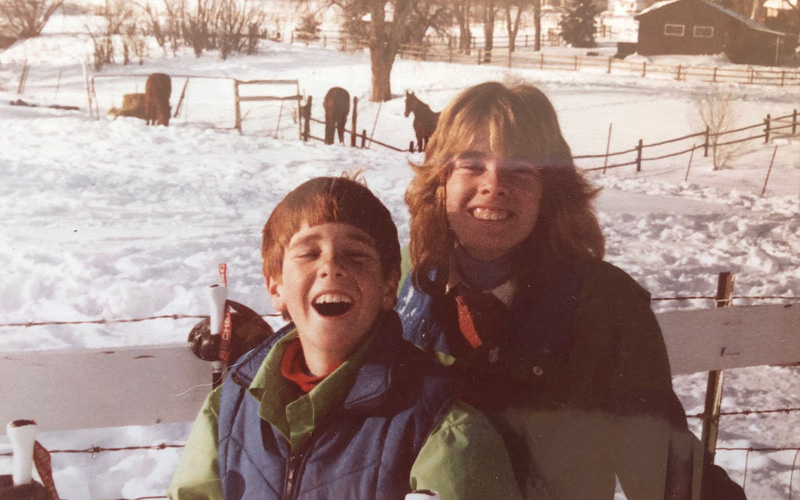How a fake giveaway cracked open my understanding of trust, injustice, and empathy.
On the middle shelf, a sign next to an empty fishbowl catches my eye: “Enter-to-Win Contest.” The instructions are simple, “To participate: Fill out the entry form with your full name, address, and phone number. Place the completed form in the bowl. Only one entry per person, and submissions must be made in person.” The final line, “Winners will be announced at a future date,” sends me and my little brother Robby into a frenzy.
Robby is seven years old and I’m ten. We don’t need a brand-new TV, stereo, microwave, a set of pots and pans, or the set of dishes displayed near the entrance of our mom and dad’s Fireplace store—but that doesn’t matter. The thrill of possibly winning something is all consuming.
 We eagerly fill out our entries—I even use my new cursive writing— and drop them into the bowl. But before our slips can settle among the others, a salesman swoops in. “You can’t enter,” he says, fishing out our papers. “Your dad owns the store. It’s only for customers.”
We eagerly fill out our entries—I even use my new cursive writing— and drop them into the bowl. But before our slips can settle among the others, a salesman swoops in. “You can’t enter,” he says, fishing out our papers. “Your dad owns the store. It’s only for customers.”
Robby’s face falls. But soon our disappointment fades, and we become obsessed with who will win. We picture the big moment: a winner standing under a shower of confetti, balloons dropping from the ceiling, a crowd cheering just like on The Price is Right. We can almost hear the music, feel the electricity in the air, taste the victory.
Each day, we watch the fishbowl fill with entries. And each night, we ask our dad, “When are you gonna pick the winners? Can we please be the ones who pick the names out of the bowl? Pretty, pretty please, with a cherry on top?” We beg relentlessly, bubbling over with excitement.
His answer never changes. “No, you can’t pick the names. I don’t know when the contest ends. I’ll let you know,” he says dismissively.
Then something shifts.
A man begins showing up every Saturday. He’s skinny, with yellow hair, a scraggly beard, crooked teeth, and a dirty checkered shirt. Each time he comes in, he asks the same question to whoever is behind the sales counter: “When will you announce the winners?”
Robby and I start rooting for him. We call him Skinny Beard Guy and notice how much he really wants to win. And maybe—we decide—he actually needs those prizes. So we continue to pester Dad over and over: “When are you going to announce the winners?”
He shrugs, slightly irritated. “I don’t know.”
This goes on for weeks.
One night, on a rainy drive home from the store, after I ask Dad one too many times, his patience snaps.
“Enough!” he yells, gripping the steering wheel so hard his knuckles turn white. “Nobody’s going to win! It’s not a real contest! Contests are never real, and nobody ever wins!”
His words feel like a punch in the gut. The air leaves the car. Everything goes still. The worn windshield wipers continue to squeak and chatter from side to side.
“I threw away the entry forms,” he shouts, his neck turning red. “It was just to get people into the store. Do not ask me about it again!” He slams his fist against the steering wheel just as the car in front of us jerks to a stop when the stoplight turns red. We screech to a stop just in time.
I am stunned. But more than that, I’m devastated.
What about Skinny Beard Guy?
My mind races: How are we going to tell him? He really wants to win—needs to win. Maybe we can just give him the TV? Contests aren’t fake. Robby and I see people win on The Price is Right, all the time.
But mostly I keep thinking, how could Dad do this?
The following Saturday, when Skinny Beard Guy shows up, Robby and I duck behind the sales counter. Dad greets him next to the now empty display case. We watch Dad place a hand on his shoulder explaining how someone else won. He even says he’s sorry. Skinny Beard Guy’s head drops.
I burn with anger. What a liar!
Robby looks at me, wide-eyed, silently begging me for an explanation I don’t have. I see his confusion, disappointment, and his sadness for Skinny Beard Guy—I feel it too. But I have no words for what we’re witnessing.
Two weeks later, the TV ends up in our den. The stereo goes to our cabin. And the pots and pans stay boxed until I use them years later in my first college apartment. I never see the plates—or Skinny Beard Guy—again.
Watching Skinny Beard Guy walk out of the store and into the blowing snow that day, with his head low and shoulders slumped, was life changing.
It was more than just witnessing one man’s disappointment–it became the lens through which I view human interactions. I started noticing how often people are brushed off, how easy it is to look away. That moment stayed with me. It made me want to understand people better, especially those who are hurting. It made me want to tell the truth, first in small ways, and eventually thought the stories I’ve spent years writing and sharing.
That day, I leaned that simple acts of dismissal, dishonesty, and disregard can have a deep impact on someone’s spirit. That dishonesty, even when cloaked in something as small as a store contest, can carry quiet cruelty. That false promises erode trust. And that people on the margins—those who already carry invisible burdens—are often the ones most hurt by such cruel betrayal.
I still wonder what became of Skinny Beard Guy. But more than that, I remember the lesson: Words matter. Promises matter. People matter.




